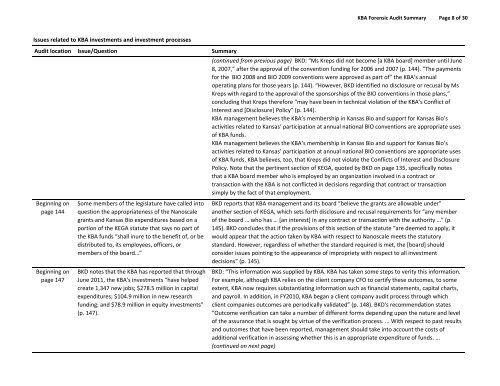Complete 2012 forensic audit documents - Kansas Bioscience ...
Complete 2012 forensic audit documents - Kansas Bioscience ...
Complete 2012 forensic audit documents - Kansas Bioscience ...
Create successful ePaper yourself
Turn your PDF publications into a flip-book with our unique Google optimized e-Paper software.
KBA Forensic Audit Summary Page 8 of 30<br />
Issues related to KBA investments and investment processes<br />
Audit location Issue/Question Summary<br />
Beginning on<br />
page 144<br />
Beginning on<br />
page 147<br />
Some members of the legislature have called into<br />
question the appropriateness of the Nanoscale<br />
grants and <strong>Kansas</strong> Bio expenditures based on a<br />
portion of the KEGA statute that says no part of<br />
the KBA funds “shall inure to the benefit of, or be<br />
distributed to, its employees, officers, or<br />
members of the board…”<br />
BKD notes that the KBA has reported that through<br />
June 2011, the KBA's investments “have helped<br />
create 1,347 new jobs; $278.5 million in capital<br />
expenditures; $104.9 million in new research<br />
funding; and $78.9 million in equity investments”<br />
(p. 147).<br />
(continued from previous page) BKD: “Ms Kreps did not become [a KBA board] member until June<br />
8, 2007,” after the approval of the convention funding for 2006 and 2007 (p. 144). “The payments<br />
for the BIO 2008 and BIO 2009 conventions were approved as part of” the KBA’s annual<br />
operating plans for those years (p. 144). “However, BKD identified no disclosure or recusal by Ms<br />
Kreps with regard to the approval of the sponsorships of the BIO conventions in those plans,”<br />
concluding that Kreps therefore “may have been in technical violation of the KBA’s Conflict of<br />
Interest and [Disclosure] Policy” (p. 144).<br />
KBA management believes the KBA’s membership in <strong>Kansas</strong> Bio and support for <strong>Kansas</strong> Bio’s<br />
activities related to <strong>Kansas</strong>’ participation at annual national BIO conventions are appropriate uses<br />
of KBA funds.<br />
KBA management believes the KBA’s membership in <strong>Kansas</strong> Bio and support for <strong>Kansas</strong> Bio’s<br />
activities related to <strong>Kansas</strong>’ participation at annual national BIO conventions are appropriate uses<br />
of KBA funds. KBA believes, too, that Kreps did not violate the Conflicts of Interest and Disclosure<br />
Policy. Note that the pertinent section of KEGA, quoted by BKD on page 135, specifically notes<br />
that a KBA board member who is employed by an organization involved in a contract or<br />
transaction with the KBA is not conflicted in decisions regarding that contract or transaction<br />
simply by the fact of that employment.<br />
BKD reports that KBA management and its board “believe the grants are allowable under”<br />
another section of KEGA, which sets forth disclosure and recusal requirements for “any member<br />
of the board … who has … [an interest] in any contract or transaction with the authority …” (p.<br />
145). BKD concludes that if the provisions of this section of the statute “are deemed to apply, it<br />
would appear that the action taken by KBA with respect to Nanoscale meets the statutory<br />
standard. However, regardless of whether the standard required is met, the [board] should<br />
consider issues pointing to the appearance of impropriety with respect to all investment<br />
decisions” (p. 145).<br />
BKD: “This information was supplied by KBA. KBA has taken some steps to verity this information.<br />
For example, although KBA relies on the client company CFO to certify these outcomes, to some<br />
extent, KBA now requires substantiating information such as financial statements, capital charts,<br />
and payroll. In addition, in FY2010, KBA began a client company <strong>audit</strong> process through which<br />
client companies outcomes are periodically validated” (p. 148). BKD's recommendation states<br />
“Outcome verification can take a number of different forms depending upon the nature and level<br />
of the assurance that is sought by virtue of the verification process. ... With respect to past results<br />
and outcomes that have been reported, management should take into account the costs of<br />
additional verification in assessing whether this is an appropriate expenditure of funds. ...<br />
(continued on next page)


